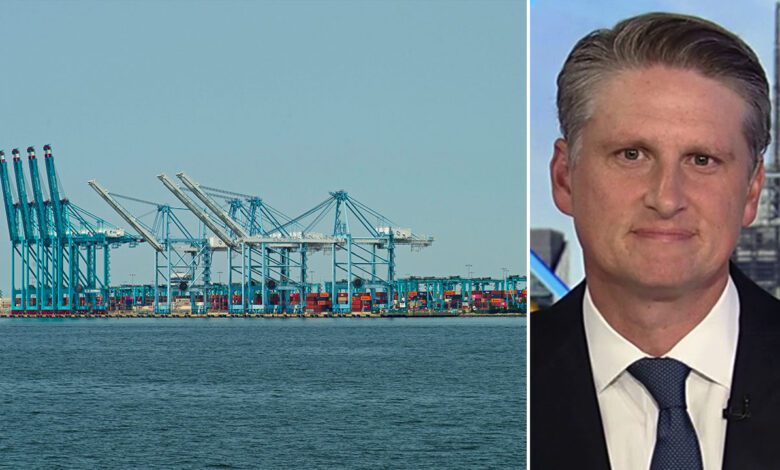
The American economy could see billions wiped away in just one day if port workers along the U.S. East and Gulf coasts strike.
Eric Hoplin, CEO and President of the National Association of Wholesaler-Distributors warned that American consumers and businesses should expect to “feel the pinch” if the International Longshoremen’s Association (ILA) decides to move forward. The move would impact ports that handle about half of the nation’s cargo from ships.
According to Hoplin, if the ports were to shut down for a single day and remain closed for three to five days, the American economy could take a $3.7 billion hit “every single day.”
“Look, as we are approaching the Christmas holiday, there are an enormous amount of goods that are coming in, flowing to the United States… they’re going to have no option but to stay offshore,” he stressed.
Despite the economic toll the strikes would have, Hoplin suggested that there is some temporary “good news.”
TEAMSTERS WILL NOT MAKE PRESIDENTIAL ENDORSEMENT DESPITE MEMBER SUPPORT OF TRUMP
“America’s wholesale distribution industry [is] ready for problems like this in the supply chain. So, you know, they’re trying to stock up in the warehouses. They’re diverting supplies maybe to the West Coast and doing some other things,” he said.
The ILA, which is negotiating on behalf of 45,000 dockworkers at three dozen U.S. ports from Maine to Texas that collectively handle about half of the country’s seaborne imports, has warned its members are prepared to stop work if they don’t have a new contract by the Oct. 1 deadline.
During a cargo news briefing, Port of L.A. Executive Director Gene Seroka said the port “had back-to-back months where imports have eclipsed the half million mark.”
He went on to mention that the “elevated volume, some of which is typically headed to other gateways, has been coming our way for several reasons.”
As ports prepare for the consequences of a potential strike, the ILA is looking to increase wages and secure a ban on automated cranes as well as gates at the ports.
Hoplin argued that unions are calling “automation a cancer” as he described America’s ports as some of “the least efficient on the planet.”
“Rotterdam in the Netherlands has the most volume around the globe. They went to automation some years ago. They were able to do it without significantly reducing jobs. And their ports are so much more efficient than ours,” he expressed.
Hoplin stressed that the ILA’s reluctance to embrace automation could have an inflationary impact on the U.S.
“Imagine what happens if they agree to those terms. We don’t have automation at the ports. We have inefficiencies for decades which can pass on costs to the consumers and to businesses. So, it’s inflationary over the long term, not just the short term,” he explained.
“I think at the end of the day, they’re [ILA] too unreasonable here. They’ve got to come to the table. They’ve got to negotiate,” Hoplin suggested.
GET FOX BUSINESS ON THE GO BY CLICKING HERE
FOX Business’ Daniella Genovese contributed to this report




